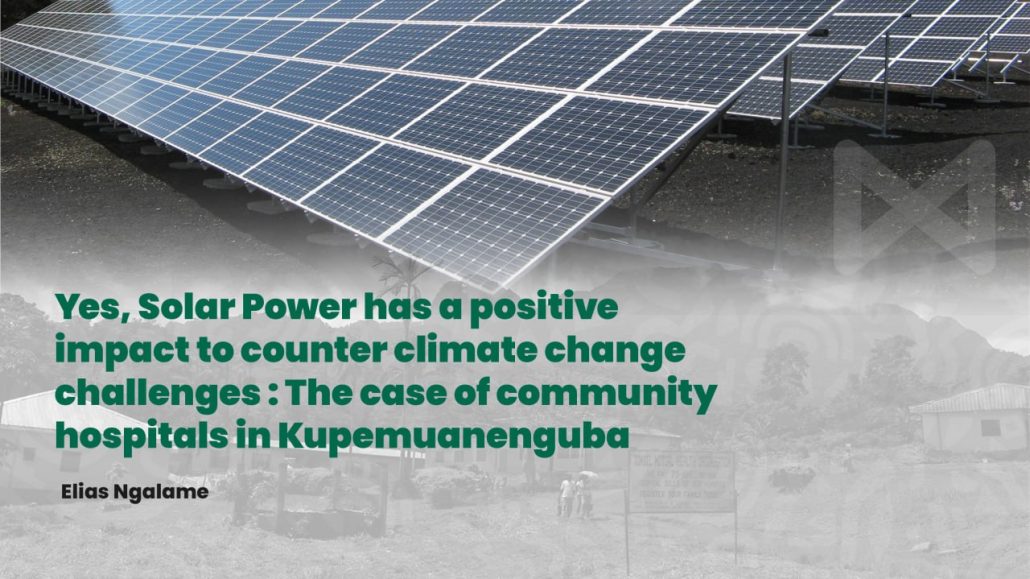By Elias Ngalame
In Cameroon, the question of abandoning fossil fuels in favor of renewable energy remains a major issue in an environment where fossil fuels are still widely used. However, in such a context, certain parties are gradually opting to use renewable energy, such as solar panels, to play an active part in the fight against climate change. The use of solar panels in community hospitals Kupemuanenguba prove that the use of renewable energies is part of the solution to climate change.
The challenges in accessing modern healthcare facilities in rural communities in Cameroon has been a frightening experience. The situation is even worse where electricity power supply has become very unreliable because of prolonged drought, thus depriving the few available hospital facilities from rendering basic health services,according to the CEO of the Centre for Community Regeneration and Development, CCREAD, Dr Hilary Ewang Ngide. This climate change induced predicament is faced by much of the rural population across sub-Saharan Africa where local clinics are frequently unable to provide adequate diagnostic and treatment services due to unreliable power supply, he says.
Bangem like most communities in the Southwest region have suffered from persistent blackouts that characterize hydro-electricity supply in Cameroon. According to the director of Bangem sub-divisional hospital, Dr Essambe Emmanuel, « the energy supply crisis has been a big problem to the proper functioning of the hospital ». But these days, the people of Bangem and Ndibisi, another village very close to Bangem no longer have to worry about electricity supply lapses, after the installation of a new solar-powered system in hospitals in the two communities by CCREAD.
Installation of solar panels at the Bangem district hospital
According to Dr Hillary Ewang Ngide, « Women don’t have to give birth in the dark, children are vulnerable to disease and deprived of treatment because vaccines cannot be refrigerated. Residents and local authorities in Bangem say the solar energy supply is a welcome relief that will help them cope against the effects of climate change and the fight against poverty.
« With the solar energy we are no longer afraid of power outages that prevent us from time to time to carry out our commercial activities, charge our phones for communication, » notes Abel Mbwoge, a farmer resident in Bangem town. « Our wives can now give birth in the hospital without any fear, » he adds.
For the community council mayor it’s an opportunity for residents to expand business. « The solar energy backup power in the community has encouraged residents to also buy mobile phones, radios and televisions, giving them regular access to the media and the internet. Many are engaging in small commercial businesses » said Bangem council mayor, Ekungwe Christopher.
The administration in Kupemuaneguba also expressed joy over the coming of solar energy in the community : « We are glad that the elite are making efforts to contribute to the development of the division after the Anglophone crisis. The solar energy project is quite commendable and a welcome relief to the population » says the SDO for Kupemuanenguba Ekema Willams after the installation of the project in Bangem hospital.
Some areas greatly affected by the Anglophone crisis that started in 2016 are the rural communities in the Southwest region including Bangem, Nguti and Tombel in Kupemuanenguba, Ekema Williams says. The administrator expressed regrets that many people were killed or injured, and infrastructure was severely damaged including some health centers. « Re-equipping the hospitals especially with energy supply brings hope instills confidence that peace has at last return in the community, »
Statistics in Cameroon show a weak energy supply rate in the country especially in the rural areas. The report reveals that only 3,703 rural communities out of 13,703 are lit. The overall coverage rate in rural areas is 20 percent. Experts say for too long, a lack of reliable power has prevented people in remote and rural communities in sub-saharan Africa from accessing the healthcare they need, when they need it.
According to UN report, the rolling out of solar projects in remote communities in Africa comes to help in the improvement of primary health care. It notes that of the more than 800 million people around the world living without electricity,half of them are found in sub-Saharan Africa alone. Yet health clinics, maternity wards, surgery blocks, medical warehouses and laboratories rely on electricity to refrigerate medicines, power lights, sterilize equipment and operate life-saving medical devices. « But intermittent or unreliable power sources put the lives of these communities at risk .»
The photovoltaic solar energy system installed in Bangem and Ndipsi according to CCREAD consists of three autonomous modules that will provide the electricity for interior lighting in the hospitals, street lighting in the vicinity and the electricity for the operation of the hospital equipment. Environment experts say for decades, the threat of climate change has also grown aggravating the energy supply crisis. « The energy crisis is linked partly to the depletion of different staints of our natural resources, especially trees. When persistently felling our trees, we encourage drought and without water energy supply is at risk » says the CEO of Community Action for Development, CAD, an environment protection NGO based in Bangem. Solar energy is a renewable, carbon-free resource available in every geographic region with enormous potential to reduce our Green House Gases[ GHG] emissions. Environment experts say any policy proposal to address climate change should include significant development of solar and other clean energy technologies to power a clean, affordable economic future.
Hospital staff pose with the Donnor of the solar energy CEO of CCREAD Dr Hillary Ewang
According to Chariot Energy 2022 report solar produces less life-cycle GHG emissions than conventional fossil fuel energy sources. While there may be some GHG emissions produced during the manufacturing and recycling of the solar system, the generation of energy results in zero GHG emissions and zero environmental impact, the report says. Experts say the transition to renewable energy is a key driver of growth and job-creation in the African continent. « Access to renewable energy in rural areas of Africa goes beyond lighting up homes and fighting climate change. It also enables people to connect to the wider world and boosts their economic prospects and job creation » says Harrison Nnoko, CEO of AJEMALEBU-SELF HELP, AJESH an NGO that works with local communities in the Southwest and Littoral regions of Cameroon.



